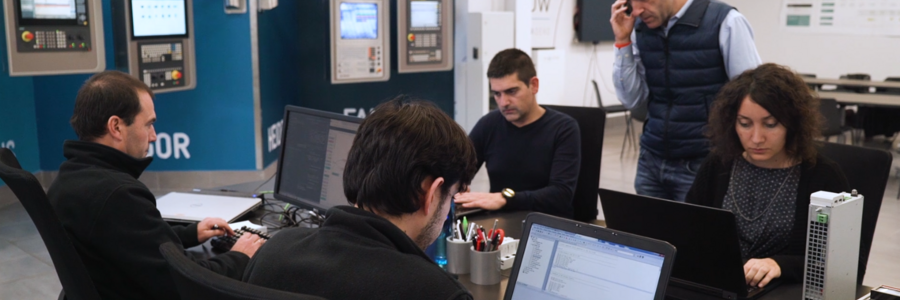Own development model for Integrated Management of Technological Innovation.
Digital Twin towards Zero Defects Manufacturing (ZDM) and circular economy

Digital twins are virtual models of a process or product that digitally reproduce the behaviour and performance of its real version with near precision. In this project, digital twins of production processes, machine tools and manufacturing centres will be developed and used to solve specific problems of machine tool manufacturers and end users.
The objective of this project is to develop digital tools with which virtual representation models of machines are generated to accelerate their manufacture and implementation.
The digital twins to be developed in the project will go beyond the current state of the art with a new multidisciplinary virtual modelling approach. The combination of different simulation and emulation tools will yield a holistic vision combining different engineering fields in the same simulation environment.
The fusion of real data (empirical data, acquired directly from the machines) with synthetic data (generated by simulation systems) will make it possible to obtain sufficient data from the systems to be able to use tools for data analysis and to generate data models that make it possible to minimise defects and thus achieve the objectives of a circular economy.
The main application sector for TWINGOALS will be the automotive industry, but it will also surely find its way to the machining sector and many other sectors. In this context, machine tool manufacturers will benefit from applying digital tools throughout the product life cycle (design, manufacturing, commissioning, maintenance and after-sales service). On the other hand, end users, whose main concern lies with the operation of the machine, and in particular with the verification of CNC programs, will be able to use simulation solutions linked to data analysis systems so they can accelerate their design, cycle optimisation and program validation processes.
The expected results of the project will be:
1- Optimised machining operations.
Combining process simulation with machine simulation enables checking different machining strategies and prediction of tool wear (i.e. enhanced quality of the manufactured part).
2- Shorter lead times of the design process.
Machine designers will be able to create new prototypes and simulate a variety of what-if scenarios using realistic digital models.
3- More efficient processes.
The digital twins will be used to model complex processes, allowing to identify inefficiencies (standby times, inefficient movements of material and people,...) and to manage the flexibility of the production lines.